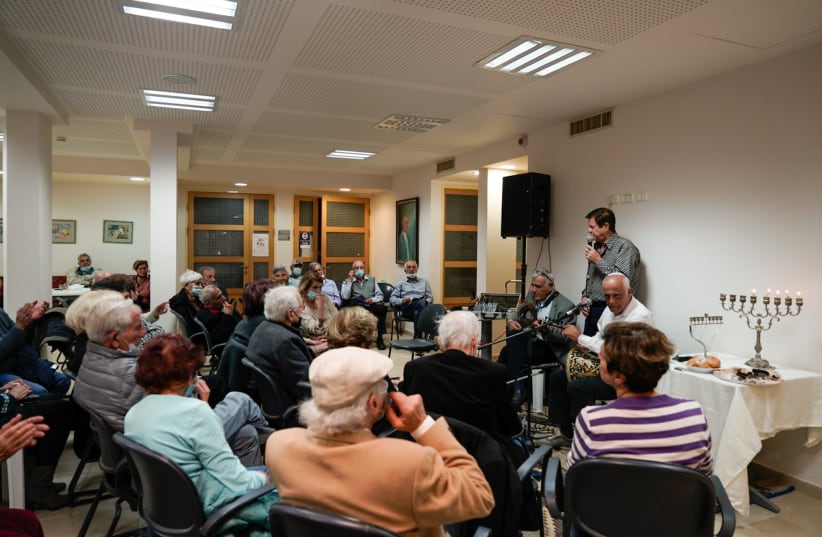Israel’s Iraqi Jewish community is determined to keep its traditions alive.
After a two-year hiatus due to COVID-19 restrictions, members of the community gathered for a Health Ministry-approved Hanukkah celebration in Jerusalem on Wednesday night. The Iraqi Jewish Club organized the event, held at the Beit Hofmann seniors’ center.
Aziz Jalal, who was born in Baghdad but recalls little of the place because he left when he was very young, sang several traditional Iraqi songs to great praise.
“The songs I sing mostly speak about a longing for Iraq,” he told The Media Line. “We sing these songs here at weddings and parties. I’ve also performed for Jewish communities in America.”
Celebrated oud player Roni Dalal and percussionist Herzl Sagi, on the darbuka, accompanied Jalal.
Hanukkah, the eight-day holiday also known as the Festival of Lights, began on Sunday evening. It marks the rededication of the Second Temple in Jerusalem during the Maccabean Revolt against the Seleucid Empire in 164 BCE.
Little remains of Iraq’s once-thriving Jewish community. After years of violence and persecution in the mid-20th century, the vast majority of its members fled the country and were forced to relinquish their citizenship under Iraqi law.
Some 130,000 Jews were airlifted to Israel in 1950-1952, in what is known as Operation Ezra and Nehemiah.
“What I remember in Iraq is that everyone [in the community] acted like brothers to one another. Everyone tried to help each other out,” Ora, an 85-year-old woman who was born in Iraq, recounted to The Media Line. “These days, we in the Iraqi Jewish community try to keep in touch [with one another].”
Born in Iraq in 1932, Ezra Kamma was 17 years old when he immigrated to Israel.
He remembers life in Baghdad very well.
“There was no Jewish ghetto in Baghdad,” Kamma, a retired judge who was once vice president of the Jerusalem District Court, told The Media Line. “We lived side by side with our Arab neighbors. I lived in a very mixed neighborhood with Jews and Arabs.”
The good times for Iraq’s Jews came to an abrupt end in 1941.
Nazi propaganda during World War II and rising Iraqi nationalism stoked anti-Semitic sentiment, with the hatred reaching a fever pitch during the Farhud, a pogrom against the Jews of Baghdad on June 1-2, 1941.
The Farhud broke out in Baghdad over the Jewish holiday of Shavuot. Hundreds of Jews were killed or raped and 1,000 wounded, though exact figures remain unclear.
“In my view, this was the turning point from which Iraqi society never recovered,” Kamma said.
The Jewish community there, with its rich 2,500-year-old history, developed unique customs over the centuries for most Jewish holidays, including Hanukkah. According to Kamma, in Iraq only fathers were permitted to light the menorah and sons would stand nearby to hear the blessing.
“Hanukkah in Iraq was unlike what we know today,” he affirmed. “While we’re told to set the menorah in a window or outside, this was not possible in Iraq. In Iraq, we would light the menorah inside so that it could only be seen indoors.”
At Wednesday’s get-together, there was music, storytelling and merrymaking. Perhaps above all, however, hope lingered that the next generation would keep the Iraqi Jewish Club − and its members’ customs − alive.
“We all live in Jerusalem and these days there are not that many Iraqis with young children in Jerusalem who can maintain this club’s tradition,” Baruch Meiri, cultural coordinator of the Iraqi Jewish Club, told The Media Line.
“We’re trying to bring them in and get them involved in activities that they’d like,” he continued. “We want to innovate and we’re ready to hand over the mantle [to the younger generation] so that they can lead this club and take it to new and perhaps more interesting places. What’s important is that our traditions be preserved.”
